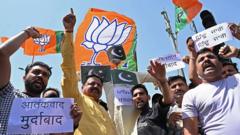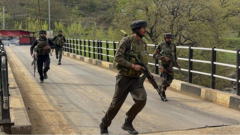Following a deadly attack in Kashmir attributed to unidentified militants, Pakistan's leadership has expressed a desire to avoid escalating conflict with India. Nevertheless, the Indian government has hinted at military measures, prompting concern among analysts and the public regarding the unpredictability of the situation between the two nuclear-armed nations.
Tensions on the Rise: Pakistan Remains Cautious After Kashmir Attack

Tensions on the Rise: Pakistan Remains Cautious After Kashmir Attack
In the aftermath of a militant assault in Indian-administered Kashmir, Pakistan's government seeks to de-escalate tensions while analysts warn of potential military responses from India.
In a measured response to the tragic loss of over two dozen Indian civilians in Kashmir, the Pakistani government has emphasized its disinterest in escalating tensions with India. Yet the mood across Pakistan is one of anxiety as Indian officials signal possible military action in retaliation for the assault, which occurred in a popular tourist area of Indian-controlled Kashmir.
While the Indian government has yet to officially name those responsible for the violence, it quickly implemented punitive measures against Pakistan, including halting a crucial water treaty to showcase its stance against what it perceives as Pakistan's support for terrorism.
In light of this development, Pakistan scheduled a session of the National Security Committee, its top decision-making body for matters of security and foreign relations, to discuss potential actions following India's announcement.
The Kashmir attack has rekindled a familiar cycle of blame and denial between the two neighbors, who have a long history of conflict over the disputed region. Indian media, often aligned with Prime Minister Narendra Modi's government, wasted no time in pointing the finger at Pakistan, which in turn denied any involvement, suggesting that India was attempting to divert attention from its own security challenges in the area.





















